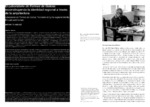Mostrar o rexistro simple do ítem
El Laboratorio de Formas de Galicia: reconstruyendo la identidad regional a través de la arquitectura
| dc.contributor.author | Río Vázquez, Antonio S. | |
| dc.contributor.other | Universidade da Coruña.Departamento de Composición | es_ES |
| dc.date.accessioned | 2016-02-24T16:09:50Z | |
| dc.date.available | 2016-02-24T16:09:50Z | |
| dc.date.issued | 2014 | |
| dc.identifier.citation | ZARCH Journal of interdisciplinary studies in Architecture and Urbanism, nº 3/2014, págs. 30-41 | es_ES |
| dc.identifier.issn | 2341-0531 | |
| dc.identifier.uri | http://hdl.handle.net/2183/16103 | |
| dc.description.abstract | [Resumen] El Laboratorio de Formas es un proyecto interdisciplinar impulsado por Luis Seoane e Isaac Díaz Pardo desde el exilio argentino a mediados del siglo XX, con el objetivo de reconstruir la identidad y la memoria de Galicia a partir del estudio y la divulgación de las formas existentes en su historia y tradición. Entre sus líneas de actuación se fija la recuperación de la industria cerámica creada por Antonio Raimundo Ibáñez en Sargadelos (Lugo) a comienzos del siglo XIX. Con esa intención se crean las fábricas de la Magdalena (Argentina) y, a finales de los años sesenta, el nuevo complejo industrial de Sargadelos. En su arquitectura, proyectada por Andrés Fernández-Albalat en colaboración con Díaz Pardo, el edificio industrial encuentra nuevos caminos, vinculados a la idea de un “nuevo regionalismo”, dónde se produce una atenta lectura del lugar y se busca humanizar y significar el espacio de los trabajadores. El Laboratorio entiende las formas como un amplio territorio que va desde el diseño industrial hasta la implantación urbana. Dentro de ese territorio, los principios de la modernidad evolucionan hasta convertirse en una recuperación de la identidad regional. Según defendían sus creadores, una obra debe ser hija de su tiempo pero no ignorar de dónde proviene. | es_ES |
| dc.description.abstract | [Abstract] Laboratorio de Formas de Galicia is an interdisciplinary project led by Luis Seoane and Isaac Diaz Pardo from the Argentine exile in mid-twentieth century, with the aim of reconstructing the galician identity and memory from the study and dissemination of existing forms in history and tradition. Recovering the ceramic industry created by Antonio Raimundo Ibáñez in Sargadelos (Lugo) in the early nineteenth century is fixed among its action lines. The factories of Magdalena (Argentina) and the new industrial complex in Sargadelos are create at the end of the sixties with this intention. In its architecture, designed by Andrés Fernández-Albalat in collaboration with Diaz Pardo, new paths about the industrial building are linked to the idea of “new regionalism”, with a careful reading of the site and an attempt to humanize and signify the space of workers. The Laboratorio understand the forms as a wide territory from industrial design to the urban setting. Within this territory, the principles of modernity evolve into a recovery of regional identity. According is defended by their creators, a work must be a child of its time but must not ignore where it comes from. | es_ES |
| dc.language.iso | spa | es_ES |
| dc.publisher | Departamento de Arquitectura de la Universidad de Zaragoza | es_ES |
| dc.relation.uri | http://zarch.unizar.es/index.php/es/numeros/numero-3/el-laboratorio-de-formas-de-galicia-reconstruyendo-la-identidad-regional-a-traves-de-la-arquitectura | es_ES |
| dc.subject | Arquitectura | es_ES |
| dc.subject | Siglo XX | es_ES |
| dc.subject | Galicia | es_ES |
| dc.subject | Sargadelos | es_ES |
| dc.subject | Industria | es_ES |
| dc.subject | Regionalismo | es_ES |
| dc.title | El Laboratorio de Formas de Galicia: reconstruyendo la identidad regional a través de la arquitectura | es_ES |
| dc.title.alternative | Laboratorio de Formas de Galicia: Reconstructing the regional identity through architecture | es_ES |
| dc.type | info:eu-repo/semantics/article | es_ES |
| dc.rights.access | info:eu-repo/semantics/openAccess | es_ES |
Ficheiros no ítem
Este ítem aparece na(s) seguinte(s) colección(s)
-
GI- IALA - Artigos [20]






